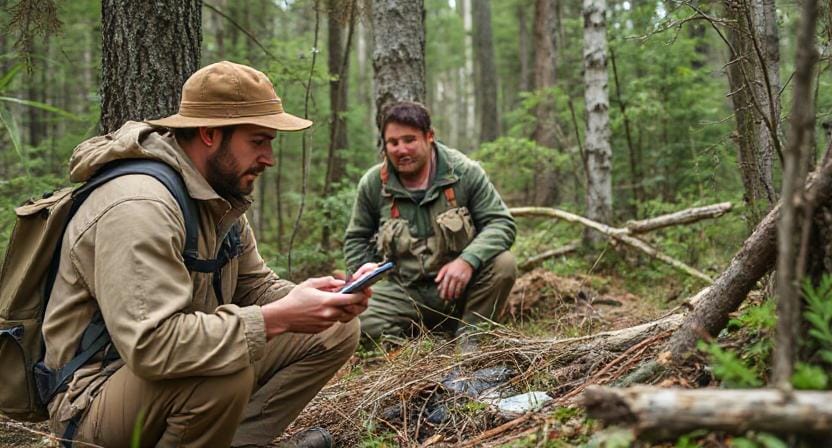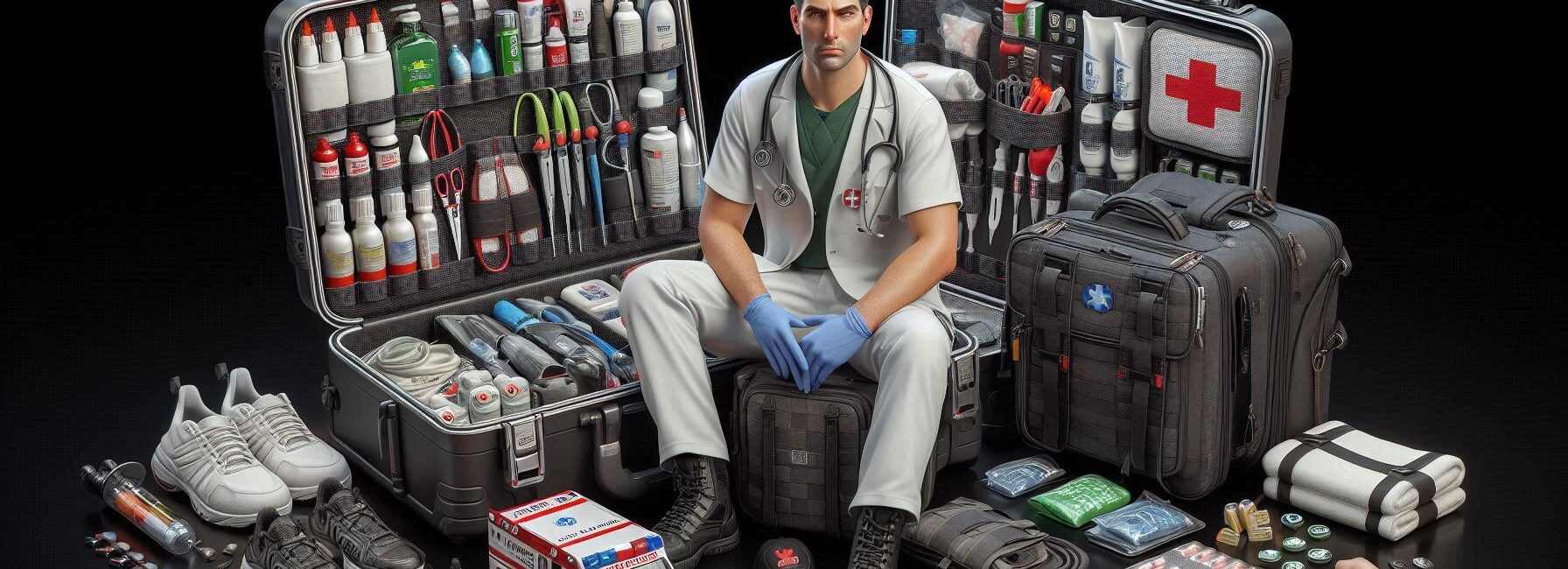Last Updated on November 2, 2025 by Kevin Collier

Top Takeaways and Key Concepts
- Make a detailed list of medications, dosages, and comfort items for emergencies.
- Keep your doctor’s contact info and important medical papers accessible at all times.
- Build an emergency kit with extra medications, snacks, and copies of prescriptions.
- Share your condition and emergency plan with family, friends, and support networks.
- Practice stress-reduction techniques and prioritize self-care to stay calm and adaptable.
When the world seems a bit wobbly, like during a natural disaster or when your favorite pizza place runs out of pepperoni, it can feel overwhelming. Keeping everything together in those moments is hard, right?
If you have long-term health problems, it can feel like trying to put together a puzzle with half of the pieces missing. You want things to go well, yet they seem hard, like putting together IKEA furniture without any directions. I know how you feel.
Please Note: This post may contain affiliate links. If you click one of them, we may receive a commission at no extra cost to you. As an Amazon Associate, I earn from qualifying purchases.
Let's work on it together. First, think about what you want. Write down a few things. Make a list of the medicines you take. Don't forget any food or other things that make you feel better. You could keep that list close by, maybe on your fridge where you can see it every day.
Next, it’s really smart to have your doctor’s contact info ready. You never know when you might need it. If something happens, it’s nice to know you can reach out and ask questions without panic.
Staying calm is tough but super important. When you feel your heart racing, take a deep breath or two. That can help you clear your head, even for just a moment. You’ll find your focus again, like putting on your favorite pair of comfy shoes.
Gather support too. Talk to friends or family who get it. Let them know how they can help. Even a quick chat or a funny meme can make a big difference when you’re feeling down. You’re not alone in this.
Remember, it’s okay to laugh a little. Humor can lighten the heavy stuff. Picture that pizza place, completely out of pepperoni. Imagine the help they’d need to solve that disaster! Keeping things light can ease the stress.
When you prep like this, you’re giving yourself a bit of power in a world that feels chaotic. You got this. Just think of each step as a small victory!
Contents of This Page
*** Shop for Survival Gear - Tools - Kits ***
Survival Gear - Bags and Backpacks - Knives - Boots/Footwear - Communication
Outdoor Cooking - Gloves - Hydration - Dry Boxes - Water Filtration Systems
Tents - Sleeping Bags - First Aid Kits - Multi-Tools - Flashlights - Fire Starters
Navigation - Survival Food - Night Vision - Headlamps - Stun Guns - Binoculars
Planning Ahead: Your Best Friend in Emergencies

Let’s start with planning because nothing says “I’m ready for anything” like having a plan. Seriously, if you fail to prepare, you might end up sitting on your couch wearing mismatched socks while chaos reigns outside.
First things first: gather all your medical supplies and medications. Make a list that includes dosages and any specific instructions—because let’s face it, “Take one when it feels right” isn’t exactly helpful.
Next, think about putting together an emergency kit that is just right for you. Think of it as your adulting survival backpack. Include extra medications (enough for at least a week), copies of prescriptions, and important medical papers.
And while you're about it, add some snacks. You never know when those annoying hunger pangs may hit! Honestly, is there anything more stressful than having low blood sugar when you need to act quickly?
Communication is Key

In any crisis situation, communication becomes vital—like the breadsticks at Olive Garden; they just make everything better! Ensure that family members or friends know about your chronic condition and what they should do if something goes awry.
This isn’t just about sharing information; it's about building a support network stronger than my Uncle Bob's obsession with fishing.
Consider setting up group texts or using apps designed for emergencies where everyone can stay informed. If you need assistance during an emergency—like grabbing more ice cream from the freezer because priorities—you want people to know how best to help you quickly.
Staying Calm Amidst the Chaos

Staying calm during a crisis is easier said than done—kind of like asking kids not to touch their Christmas presents until December 25th! But here’s the thing: stress can exacerbate many chronic conditions. So, take deep breaths (not too deep unless you want to pass out) and focus on grounding yourself.
You could try mindfulness exercises or meditation—even five minutes of quiet time can make a difference! Picture yourself lounging on a beach sipping coconut water while waves crash around you (minus the sunburn).
Practicing relaxation techniques helps clear your mind so that when emergencies arise, you're ready instead of panicking like someone who forgot their wallet at checkout.
Adaptability: The Name of the Game

Adaptability is crucial during crises because plans often go haywire faster than my dog chasing after squirrels. For instance, if there's no power due to severe weather but you rely on equipment for daily management (hello CPAP machine!), have backup options available—a battery-operated device or even manual methods whenever possible.
Don’t forget alternative resources too! Local community centers may provide shelter or support services during emergencies. Knowing where these places are ahead of time means less scrambling when panic sets in!
Self-Care: Don’t Forget About You!

All things considered—and I mean ALL things—you must prioritize self-care during stressful times. Yes, I see you rolling your eyes thinking this sounds cliché but hear me out!
When life gets chaotic outside our doors (or inside our heads), taking care of ourselves becomes even more critical than finding matching socks after laundry day.
Make sure you're eating well (even if it's just frozen pizza), getting enough sleep (no late-night Netflix binges!), and engaging in activities that bring joy—even if it means watching cute animal videos online instead of doom-scrolling through news feeds filled with bad vibes!
Seeking Professional Help
Finally—and honestly—don’t hesitate to seek professional help when needed! Whether it’s talking through anxiety with a therapist or consulting healthcare providers about treatment options tailored specifically for times like these—the sooner you reach out for assistance rather than suffering alone behind closed doors makes all difference!
Remember: professionals are trained experts equipped with knowledge beyond our wildest dreams (and likely have better advice than Googling symptoms). Embrace their expertise so that navigating challenges becomes less daunting over time!
Frequently Asked Questions
Why is it important to make a medication list before a crisis?
A written list makes it easier to access medication details quickly, avoids confusion during stress, and helps others assist you if needed.
What medical information should be accessible during an emergency?
Keep your doctor’s contact information, prescription copies, diagnosis notes, and medication details stored where you can retrieve them rapidly.
How much extra medication should be stored?
A minimum of several days to a week of backup medication is helpful so treatment is not disrupted if pharmacies are closed or inaccessible.
Why should I share my condition with trusted contacts?
Sharing allows others to know how to support you, recognize symptoms, and assist in getting help if you become overwhelmed or unable to respond.
How can stress affect chronic health conditions during a crisis?
Stress can worsen symptoms, impair judgment, and elevate physical strain, so calming techniques can reduce flare-ups and improve stability.
What tools can help me stay grounded in stressful moments?
Deep breathing, mindfulness, structured rest, and small comfort items can help you remain calm when external situations feel chaotic.
Why is flexibility important when managing chronic health in emergencies?
Unexpected events may disrupt routines, so adaptable planning ensures you can adjust medication access, support sources, or treatment steps.
Suggested External Resources:
Managing Chronic Conditions During Emergencies
https://www.cdc.gov/chronicdisease/resources/infographic/emergency-preparedness.htm
Emergency Preparedness Checklist
https://www.ready.gov/sites/default/files/2020-03/ready-emergency-kit-checklist.pdf
Chronic Condition Management Tips
https://www.ncbi.nlm.nih.gov/pmc/articles/PMC6109646/

Kevin Collier is a seasoned survivalist and expert in prepping and homesteading, contributing to WiseSurvive.com. With a deep-rooted passion for self-sufficiency and outdoor survival skills, Kevin shares practical advice, strategies, and resources to help individuals prepare for any challenge. His informative articles cover a range of topics, from essential survival techniques to sustainable living practices, empowering readers to thrive in any situation. Whether you're a novice or a seasoned prepper, Kevin's insights will inspire you to take charge of your readiness and build resilience for the future.




